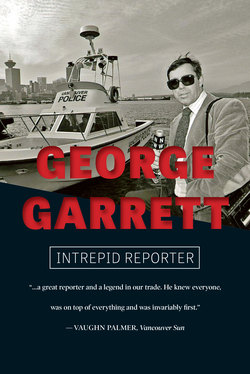Читать книгу George Garrett - George Garrett - Страница 9
На сайте Литреса книга снята с продажи.
Foreword
ОглавлениеI remember George Garrett’s last day in the newsroom. I was scheduled for the evening shift and was in my car on the way to work when Trevor Pancoust opened the 2 p.m. newscast with “Well, what would George Garrett’s last day at CKNW be without a scoop.”
George actually broke the story three hours previous on the 11 a.m. newscast with Terry Schintz—when he shocked the public (and many members of his newsroom) by revealing Gordon Wilson was leaving the political party he founded to cross the floor, and become the NDP minister responsible for the troubled BC Ferries, then mired in the so-called fast ferries fiasco.
The Trevor Pancoust quote is based only on my memory, but you can find a piece of amazing video on YouTube documenting George’s last day, and specifically the minutes leading up to his 11 a.m. scoop.
The video shows George at his best. Relentlessly—but politely—working a source to confirm information he received as a tip. People loved giving George a tip. Why? Because they could trust him to be discreet and dogged in his pursuit of a story. And because they liked him. George finally got the confirmation he required by telling his contact he was going to broadcast the details in less than ten minutes, and then saying “as a friend, I wouldn’t be making a fool of myself, would I?” George had earned the right to ask that question because of forty-three years of breaking stories without burning contacts, and he got his answer, and his last big scoop.
In the video you also see brief glimpses of George’s beloved Casio electronic day-timer. This was George’s bible. A treasure of home numbers, addresses and private cell phones of the province’s most influential people. This was long before social media made finding people much easier for journalists. These numbers were earned. And they weren’t shared with just anyone.
I’ll never forget getting a tip about Indigenous grandparents devastated by the death of their young granddaughter. They were traumatized upon learning the little girl’s eyes had been removed during an autopsy—against their wishes and cultural practice. The chief coroner at the time (now Senator Larry Campbell) hadn’t returned messages I’d left with his office staff, and I was stumped. But I couldn’t let go of the story after speaking to the girl’s grandfather. “They took the best part of her,” I remember him telling me, his voice trembling. I was so moved by his words, and, it turns out, so was George, who gave me Campbell’s home number. “Tell him George Garrett gave you the number, and I said you can be trusted.” Campbell gave me the interview, I channelled George and asked tough questions politely, and I was able to tell an important story. All thanks to George.
Though I’ve not worked with George for twenty years, I think of his advice often. “Share your tape” was one of George’s oft-repeated mantras. Specifically it meant if a competitor is late to a news conference—an event where multiple reporters were all gathering the same quotes—you should share your tape, because one day it will be you who is late. But I have always taken it to mean when there is no reason not to share information with colleagues or competitors—no reason for exclusivity or secrecy—one should always share information as we as journalists all share the same goal: to represent the public, and to educate the public. George understood this, and never let his competitiveness harm relationships with journalists, or anyone else.
George may have been the intrepid reporter to Rafe Mair and many members of the CKNW audience, but I’ve worked with many intrepid reporters over the years. I haven’t, however, worked with anyone else like George. Someone feared by ne’er do wells, and liked and respected in equal measure by colleagues, competitors, newsmakers and his audience.
— Steve Lus
Executive Producer, News, CBC British Columbia
